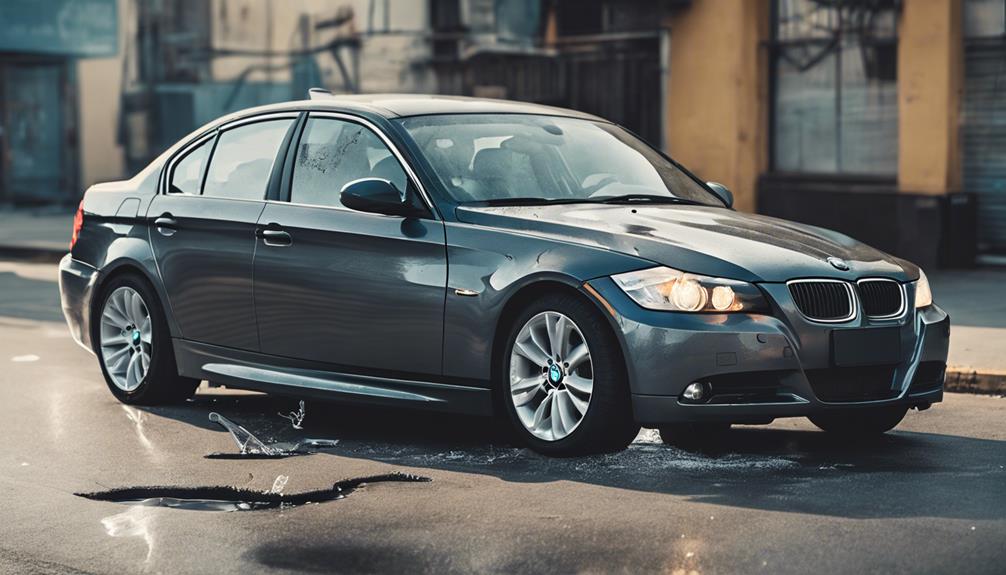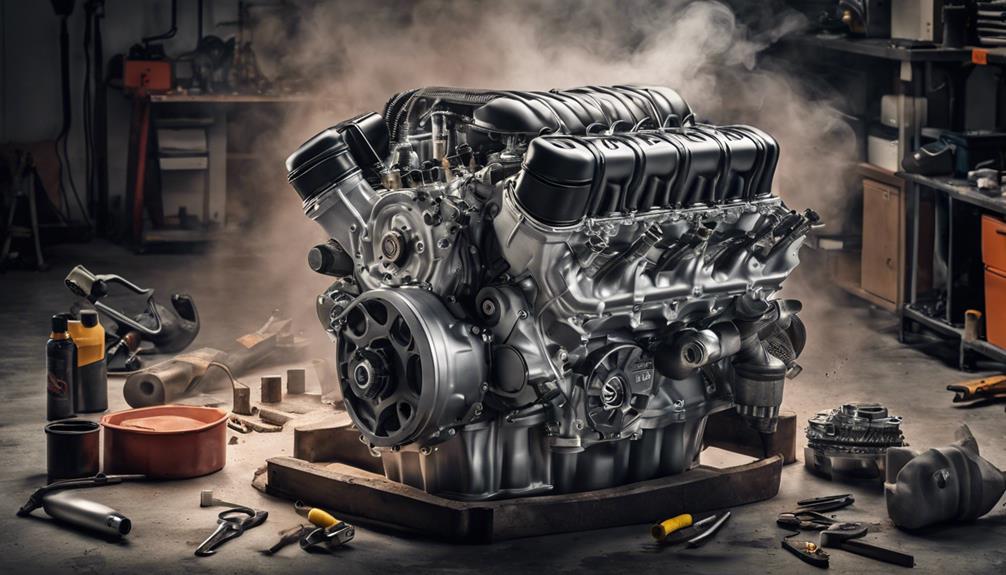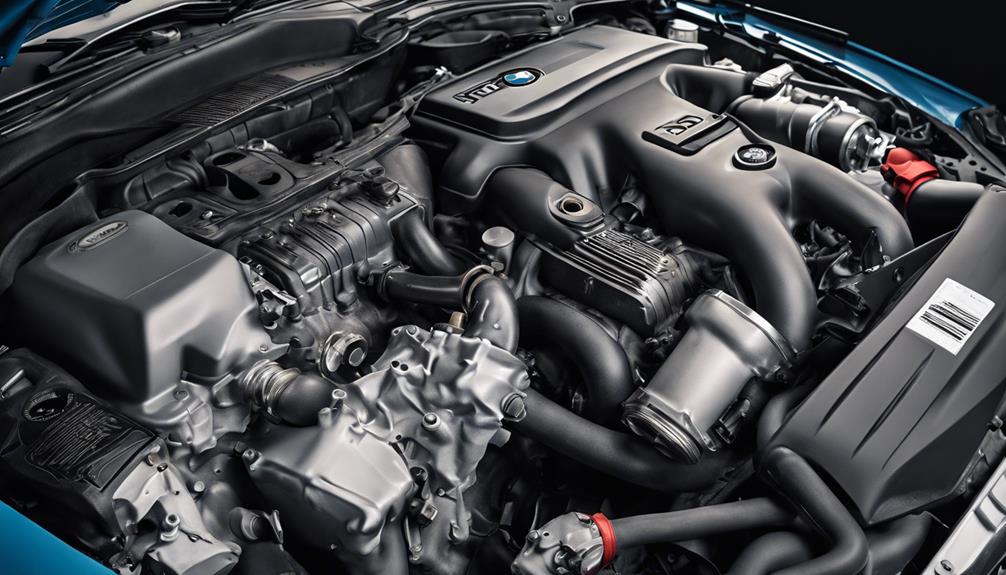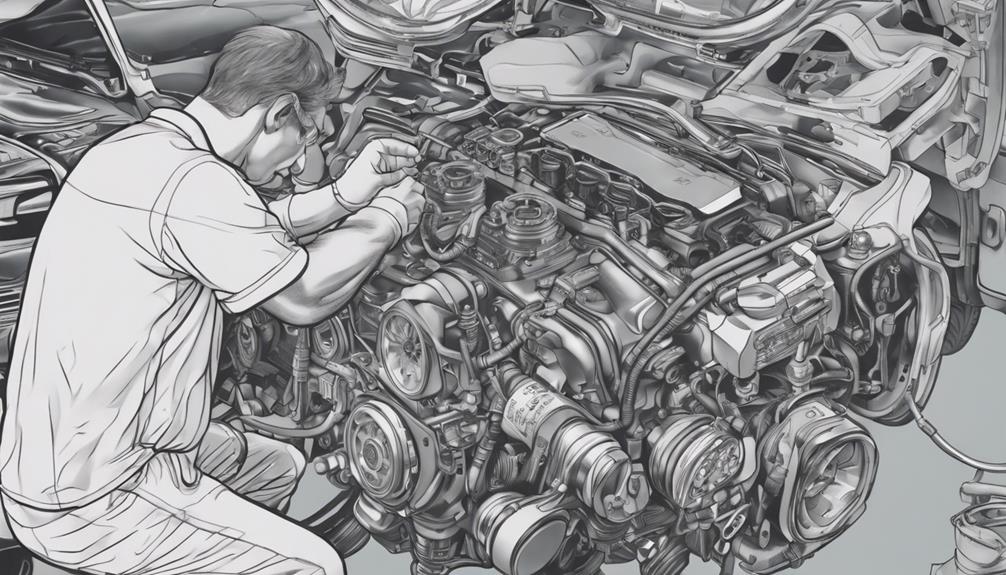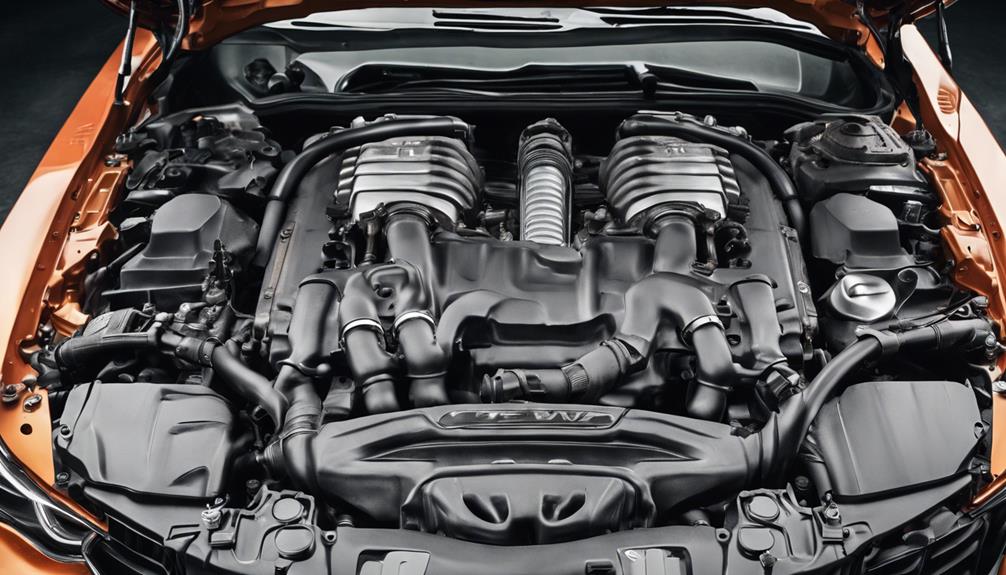Owning a BMW E90 (3 Series Sedan) opens you up to a world of potential issues, from engine leaks to VANOS solenoid glitches that demand preventive action to avoid hefty bills and guarantee your car's high-quality performance. Keep an eye on common troubles like fuel system hiccups and transmission concerns, as proactive maintenance is your shield against costly repairs and keeps your ride running smoothly. Don't ignore warning signs or unusual sounds; they could be hints of more serious problems lurking beneath the surface. Your E90 deserves care and attention to stay in peak condition and avoid surprises down the road.
Key Takeaways
- Engine leaks from oil pans and gaskets can cause severe damage if ignored.
- VANOS solenoid issues lead to power loss and rough idling.
- Fuel system problems like pump failures affect engine performance.
- Transmission concerns include rough shifting and delayed engagement.
- Cooling system failures can result in overheating and engine damage.
Engine Leaks
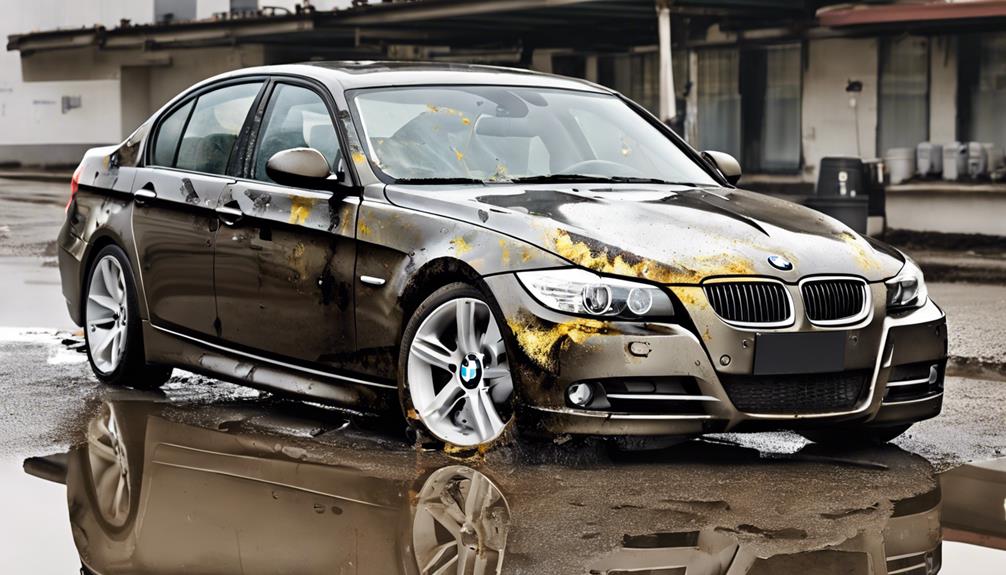
Engine leaks in the BMW E90 can be a persistent headache for owners, often originating from common trouble spots such as oil pans, valve cover gaskets, and the oil filter housing.
Neglecting these leaks can lead to severe engine damage, making regular maintenance a vital aspect of owning an E90. Specifically, issues with oil filter housing gaskets are notorious culprits. When these gaskets fail, they can cause oil to leak onto the front or side of the engine, creating a messy situation that not only affects the engine's performance but can also lead to a slipping serpentine belt.
Addressing oil leaks promptly is essential as the leaking oil filter housing can potentially damage critical engine components. By staying on top of regular maintenance checks and swiftly tackling any signs of oil leaks, you can safeguard your BMW E90 from costly repairs and guarantee its engine stays in excellent condition for miles to come.
VANOS Solenoid Malfunctions
Experiencing power loss, sluggish throttle response, or erratic idling in your BMW E90? You might be dealing with VANOS solenoid malfunctions. These essential components, responsible for fine-tuning valve timing, can suffer from oil sludge buildup, affecting engine performance.
Addressing these issues promptly through cleaning or replacement can help restore your E90's efficiency and prevent further complications.
VANOS Solenoid Symptoms
If you notice your BMW E90 having difficulty tapping into its complete capability, the culprit might just be hiding within the complex VANOS solenoid system. Here are some symptoms that could indicate an issue with the VANOS solenoids:
- Loss of Power: The VANOS solenoid's inability to adjust valve timing properly may lead to a noticeable decrease in power output.
- Slow Throttle Response: A malfunctioning VANOS solenoid can cause delays in throttle response, affecting the vehicle's overall performance.
- Rough Idling: Oil sludge buildup within the solenoids can result in erratic idling, making your E90 feel less refined than usual.
Don't let these symptoms linger; addressing VANOS solenoid issues promptly is essential to maintaining your E90's engine performance and efficiency.
VANOS Solenoid Solutions
If you've found yourself facing the vexing VANOS solenoid malfunctions in your BMW E90, be confident that effective solutions are within reach.
The oil sludge buildup that commonly plagues these solenoids can cause functionality issues like power loss and rough idling. To tackle this, consider regular maintenance to prevent these problems.
Cleaning or replacing the VANOS solenoids is a straightforward process that can mitigate issues arising from oil sludge. By staying proactive with maintenance, you can guarantee your BMW E90 operates at its best.
Don't let VANOS solenoid concerns dampen your driving experience; address them promptly to maintain peak performance in your E90.
Fuel System Issues
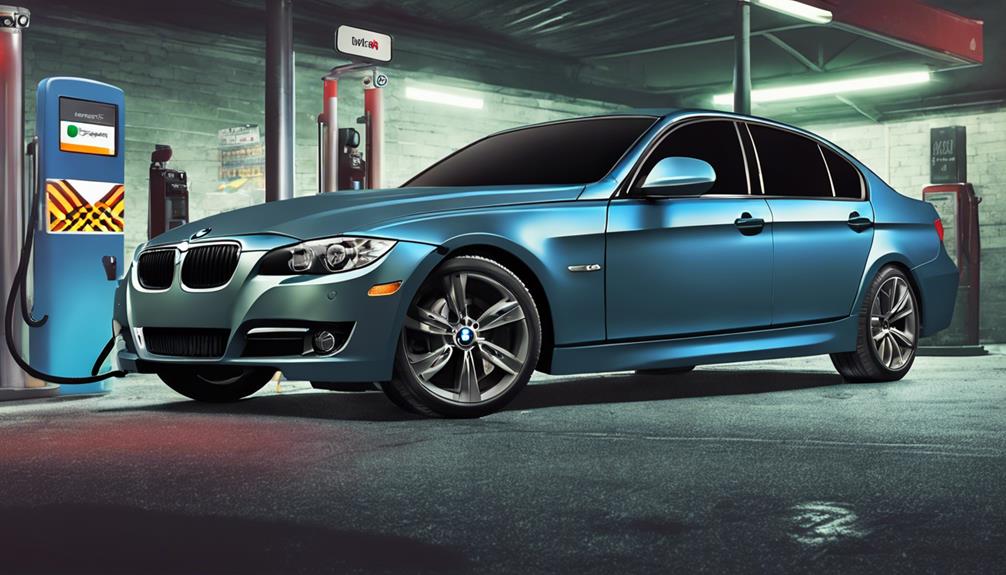
If you're experiencing fuel system issues in your BMW E90, you might be facing fuel pump failure, a clogged fuel filter, or fuel injector problems.
These issues can manifest as poor engine performance, stalling, or even difficulty starting your vehicle.
Addressing these problems promptly can save you from costly repairs down the road.
Fuel Pump Failure
Often overlooked until it's too late, fuel pump failure in BMW E90 models can wreak havoc on your driving experience and your wallet. Here's what you need to know:
- High-pressure fuel pump issues are common in early E90 N54 engines, impacting the air-fuel mixture and engine performance.
- Watch out for signs like the check engine light coming on, extended crank times, and a noticeable drop in power – these could indicate a failing fuel pump.
- Replacing a faulty fuel pump involves a complex process of removing the intake manifold, a job best suited for professionals due to its intricacy.
Addressing high-pressure fuel pump problems promptly is vital to prevent further damage and guarantee your BMW E90 runs smoothly.
Clogged Fuel Filter
Experiencing fuel system issues in your BMW E90, such as a clogged fuel filter, can lead to engine misfires and diminished performance. Neglecting regular replacement of the fuel filter, recommended every 30,000 to 50,000 miles, may result in costly repairs and reduced fuel efficiency. Symptoms of a clogged fuel filter include engine hesitation, rough idling, and difficulty starting. This can put strain on the fuel pump and other components within the fuel system. Maintaining a clean fuel filter is vital for peak engine performance. Remember, a clogged fuel filter is like a traffic jam for your engine, causing it to struggle. Stay ahead of the game by scheduling regular replacements to keep your BMW running smoothly.
| Common Signs of a Clogged Fuel Filter | Mileage Recommendation for Replacement | Importance of Regular Replacement |
|---|---|---|
| Engine hesitation | 30,000 to 50,000 miles | Peak engine performance |
Fuel Injector Problems
Fuel injector problems in the BMW E90 can be a costly headache, with N54 fuel injector seals known to deteriorate and cause engine misfiring. Engine misfiring and rough idling are common symptoms of failing fuel injectors in the BMW E90.
Keep an eye out for a check engine warning light and a potential decrease in fuel efficiency, signaling possible injector issues. The replacement cost for fuel injectors on the N54 engine can reach around $1,000, making timely maintenance important to prevent costly engine damage.
Transmission Problems
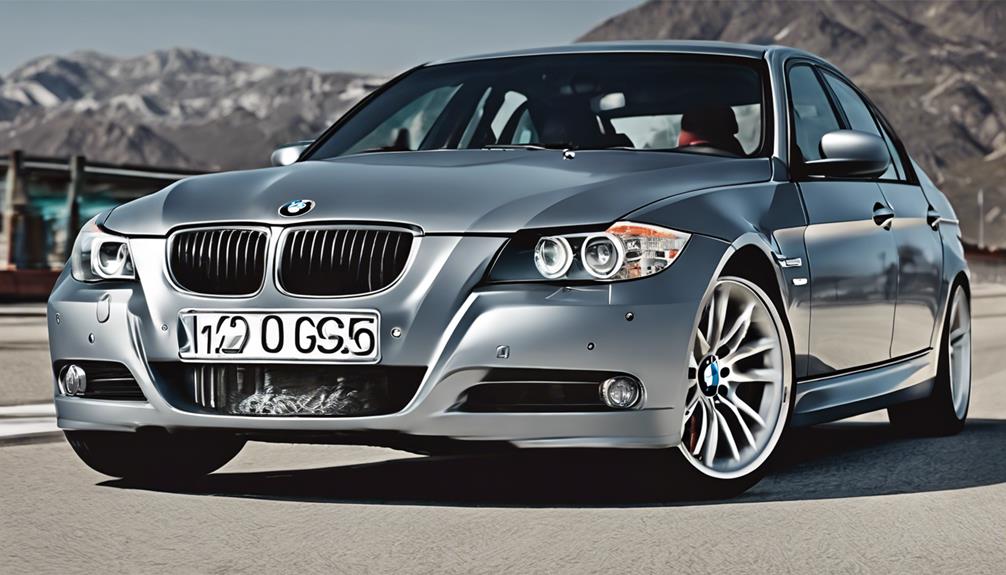
Transmission problems in the BMW E90 can be a costly headache for owners, manifesting in rough shifting and slipping gears. As your E90 ages, be wary of symptoms like delayed engagement, jerking motions, and ominous transmission warning lights. Many unlucky owners face transmission failures between 80,000 to 120,000 miles, leading to significant repair bills. Some models might even suffer from pesky transmission fluid leaks, which not only hinder performance but can also harm crucial internal components. To help your transmission go the distance, regular fluid changes and diligent maintenance are key. Stay ahead of the game by adhering to your E90's maintenance schedule, ensuring that your transmission stays smooth and trouble-free.
| Common Transmission Problems | Solutions |
|---|---|
| Rough shifting | Regular fluid changes |
| Slipping gears | Prompt maintenance |
| Delayed engagement | Professional inspections |
| Jerking motions | Address warning signs |
| Fluid leaks | Prevent internal damage |
Cooling System Failures
If your BMW E90 is showing warning signs of overheating, such as erratic temperature gauge readings or steam coming from under the hood, it's essential to address these issues promptly.
Leaks in the cooling system can stem from a variety of sources like worn-out hoses, a damaged radiator, or a faulty water pump.
To prevent catastrophic engine failures, stay vigilant for any signs of coolant leaks, perform regular checks on your cooling system, and guarantee timely replacement of components.
Overheating Warning Signs
When your BMW E90's engine temperature gauge starts creeping into the red zone, it's time to pay attention to potential cooling system failures. Here are some warning signs to watch out for:
- Coolant Leaks: Keep an eye out for any puddles or stains under your car that could indicate a coolant leak, leading to overheating.
- Low Coolant Levels: If you frequently find yourself needing to top up the coolant reservoir, it may suggest a leak or another issue within the cooling system.
- Steam or Smoke: Seeing steam or smoke coming from the engine bay is a clear indication of overheating problems that require immediate attention.
Stay vigilant for these signs to prevent any serious damage to your BMW E90's engine.
Causes of Leaks
Leaking in the cooling system of your BMW E90 can stem from various causes, such as worn-out gaskets, cracked components, or deteriorated seals. Coolant leaks are not just a minor nuisance; they can lead to engine overheating, decreased performance, and potential damage to critical engine parts. Regular inspection of your BMW's cooling system is essential to catch leaks early on. By promptly addressing any leaks and using quality replacement parts, you can maintain the reliability and performance of your BMW E90. Take a look at the table below for a quick overview of common causes of cooling system leaks:
| Common Causes of Leaks | Description |
|---|---|
| Worn-out gaskets | Often lead to leaks |
| Cracked components | Can cause coolant seepage |
| Deteriorated seals | Result in fluid leaks |
| Faulty hoses | Common source of leaks |
Preventive Maintenance Tips
To guarantee peak performance and longevity of your BMW E90, implementing preventive maintenance strategies for the cooling system is vital. Here are three tips to help you avoid costly cooling system failures and potential engine damage:
- Monitor Coolant Temperature: Regularly check the coolant temperature gauge to make sure it stays within the normal range. Sudden spikes could indicate a problem with the cooling system.
- Inspect the Electric Water Pump: Keep an eye on the electric water pump for any signs of wear or malfunction. Since it can fail without warning, proactive inspection is essential.
- Prioritize Regular Maintenance: Scheduled maintenance, including coolant flushes and system checks, is essential to preventing engine overheating and costly repairs. Stay on top of your BMW E90's cooling system health to enjoy smooth rides without unexpected breakdowns.
Electrical Troubleshooting
For effective electrical troubleshooting in your BMW E90, understanding the intricate interplay of its electronic components is vital to pinpointing and resolving issues efficiently. Common electrical issues in the E90 encompass problems with the iDrive system, power window regulators, and faulty blower motors. These issues can manifest in malfunctions across lighting, navigation, and climate control systems, affecting your overall driving experience.
When tackling electrical problems in your E90, examining fuses, relays, wiring harnesses, and control modules is essential. Diagnosis often demands specialized tools and a deep comprehension of the vehicle's complex electronic systems.
Regular maintenance and prompt repairs are essential to prevent costly electrical issues in your BMW E90 sedan. By staying attuned to your car's electrical health and addressing any anomalies swiftly, you can guarantee a smooth and hassle-free driving experience. Remember, a little proactive care can go a long way in maintaining the electrical integrity of your beloved BMW E90.
Steering and Suspension Concerns
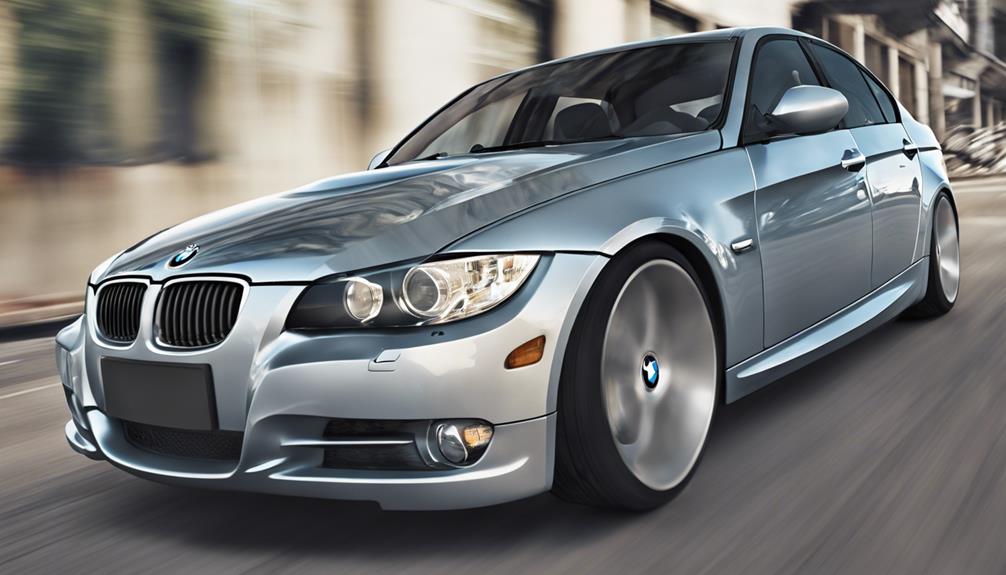
Weak sway bar end links in your BMW E90 can lead to handling and stability concerns, impacting your driving experience. Here are some key issues to ponder:
- Steering Wheel Woes: Pay attention to any unusual vibrations or clunking noises when turning the steering wheel. This could indicate issues with the sway bar end links affecting your steering control.
- Suspension Surprises: Be mindful of suspension variations between factory and sport setups. These differences can influence the E90's ride quality and performance, potentially leading to handling concerns during your daily commute or spirited drives.
- Safety First, Braking Problems Last: Faulty ABS pumps can cause braking problems, compromising your safety on the road. If you notice any inconsistencies in braking responsiveness or unusual brake pedal feel, it's pivotal to address these issues promptly to maintain safe driving conditions.
Regular maintenance and inspections play a crucial role in identifying and resolving steering and suspension challenges to uphold your BMW E90's driving dynamics and safety.
Brake System Challenges
Encountering brake system challenges on your BMW E90 can greatly impact your driving performance and safety on the road. One common issue is brake pad wear, typically occurring around 50,000 miles, leading to decreased braking effectiveness. Regular maintenance such as a brake fluid flush every 2 years or 30,000 miles is essential to prevent corrosion and guarantee ideal brake function. Another prevalent problem is brake caliper sticking, resulting in uneven brake pad wear and potential safety risks. Additionally, warped brake rotors are frequently observed in the E90, causing vibrations when braking and reducing overall braking efficiency. Consider upgrading to performance brake pads and rotors to enhance braking performance and diminish brake fade. Stay ahead of these challenges to keep your BMW E90 running smoothly and safely.
| Brake System Challenges | Common Symptoms |
|---|---|
| Brake Pad Wear | Decreased Braking Performance |
| Brake Fluid Flush | Prevents Brake System Corrosion |
| Brake Caliper Sticking | Uneven Brake Pad Wear |
| Warped Brake Rotors | Vibrations While Braking |
| Performance Upgrades | Improved Braking Efficiency |
Interior Comfort Issues
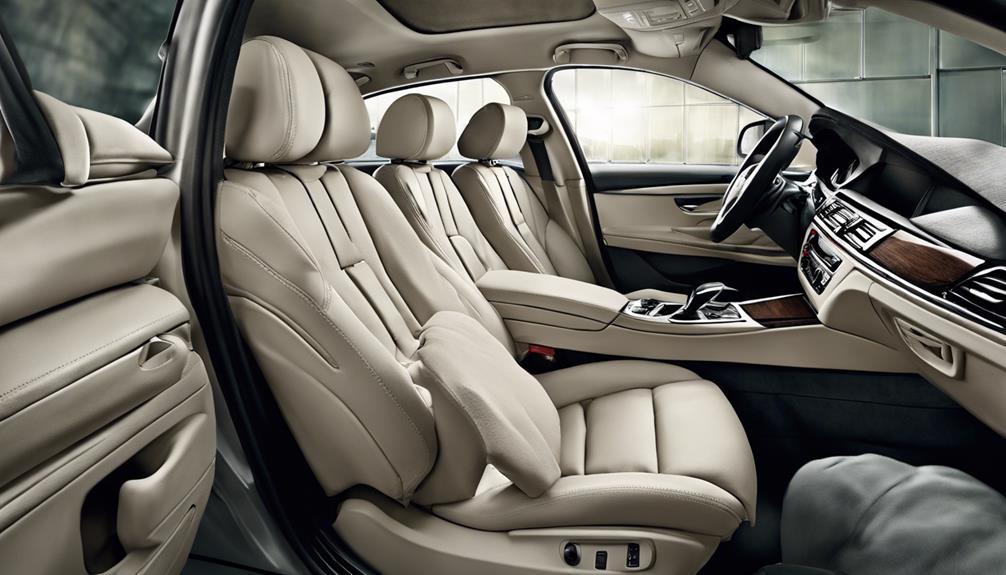
Experiencing a smooth and luxurious ride in your BMW E90 can be hindered by various interior comfort issues that affect your overall driving experience. Here are some common problems you might encounter:
- Worn-out Seats: As time passes, the seats in your BMW E90 may start to show signs of wear and tear, losing their plushness and support. This can lead to discomfort during long drives, impacting your enjoyment behind the wheel.
- Faulty Climate Control: A malfunctioning climate control system can result in inconsistent temperature settings inside the car. Whether it's blowing hot air when you want it cool or vice versa, this issue can disrupt your comfort and make driving less pleasurable.
- Excessive Cabin Noise: Excessive noise levels in the cabin can be a nuisance, affecting the tranquility of your driving environment. Poor insulation or worn seals may be culprits behind this problem, diminishing the peacefulness you expect from your BMW E90.
Exterior Body Problems
The BMW E90's exterior body is prone to various common problems that can impact both its appearance and functionality. Rust issues often plague the wheel arches and door sills, detracting from the car's sleek look. Paint chipping and peeling aren't uncommon, leaving owners with a less-than-impressive finish.
Sunroof leaks can be a headache, as seal deterioration leads to unwanted water damage inside the car – not exactly the luxury experience you'd expect from a BMW. Windshield cracking is another frequent nuisance, especially when debris from the road decides to make an unwelcome impact.
Keeping an eye out for these issues is crucial to maintain your E90's exterior in top condition. Whether it's addressing rust, dealing with paint problems, fixing sunroof leaks, or managing windshield cracks, staying on top of these exterior body problems will ensure your BMW E90 continues to turn heads for all the right reasons.
Performance and Handling Glitches
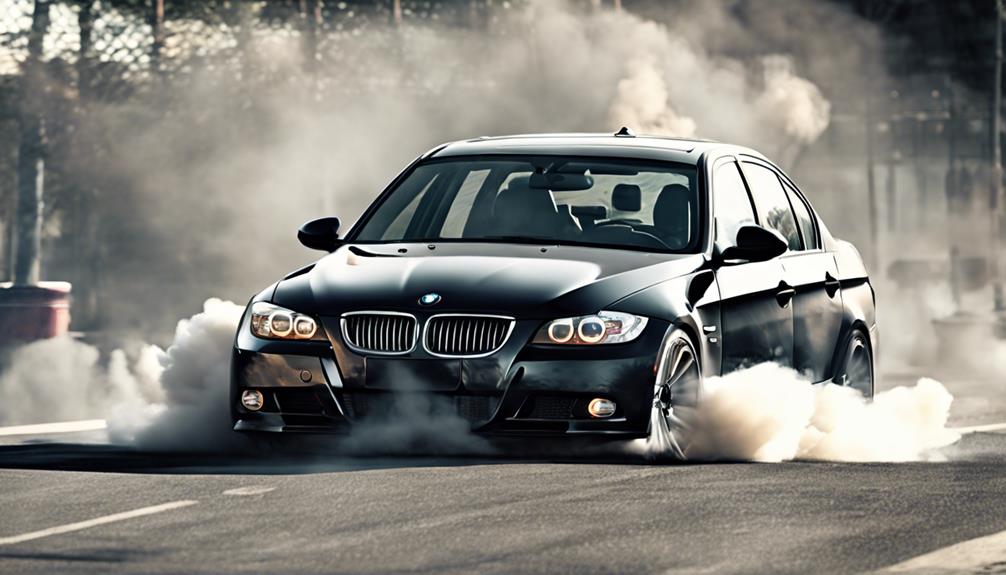
Performance hiccups and handling quirks in your BMW E90 can disrupt your driving experience and may hint at underlying issues that need attention. Let's explore some common glitches that could be affecting your car:
- VANOS Solenoid Woes: If you're experiencing rough idling or a loss of power, the VANOS solenoid might be to blame. This vital component controls the timing of the engine's valves, and a malfunction can lead to performance issues.
- High-Pressure Fuel System Mishaps: Early E90 N54 engines are prone to high-pressure fuel system malfunctions, resulting in symptoms like extended crank times and reduced power output. Keeping a close watch on this system can prevent potential headaches down the road.
- Fuel Injector Fiascos: Fuel injector problems in the N54 engine can cause misfires and rough idling. Replacing these injectors can be a costly affair, averaging around $1,000, so addressing any issues promptly is crucial to avoid further damage.
Common Reliability Concerns
If your BMW E90 is showing signs of common reliability concerns, it's important to address these issues promptly to maintain peak performance and prevent potential breakdowns.
Oil leaks are a frequent issue in the E90, often originating from areas like oil pans, valve cover gaskets, and oil filter housings. Keep an eye out for VANOS solenoid problems, which can manifest as power loss, rough idling, and sluggish throttle response, impacting your driving experience.
High-pressure fuel system glitches may affect early N54 engines, leading to symptoms such as the check engine light coming on and reduced power output. Watch for fuel injector complications too, as engine misfires and rough idling could indicate underlying issues.
Additionally, water pump failures are common culprits for engine overheating and unnecessary fan activation in the E90. Regular maintenance and timely repairs can help you tackle these reliability concerns and keep your BMW running smoothly.
Frequently Asked Questions
What Is the Common Problem of BMW E90?
When driving a BMW E90, you might encounter various issues like oil leaks, VANOS solenoid troubles, fuel system malfunctions, injector problems, and water pump failures. Keeping an eye on these common problems can help you stay ahead of potential headaches.
What Is the Most Common Problem With BMW 3 Series?
You face oil leaks in your BMW 3 Series, often from oil pans, valve cover gaskets, or the oil filter housing. Regular maintenance is essential to prevent damage. VANOS solenoid issues, fuel system malfunctions, and more demand your attention.
Is the E90 3 Series a Good Car?
Yes, the E90 3 Series is a good car with awards, high user satisfaction, and successful sales. Its design and performance excel. For the best experience, prioritize quality parts. Enjoy the reliability and popularity of this model.
How Long Can BMW E90 Engine Last?
With proper maintenance, your BMW E90 engine can last over 200,000 miles. Regular oil changes, caring for cooling systems, belts, and timely part replacements like water pumps are key. Your habits impact longevity.
Conclusion
So, if you're considering buying a BMW E90 (3 Series Sedan), be prepared for some common problems that may arise.
From engine leaks to transmission issues, this car has its fair share of quirks. However, with proper maintenance and care, you can still enjoy the performance and luxury that BMW is known for.
Just be aware of these potential pitfalls and be ready to tackle them head-on for a smooth driving experience.





